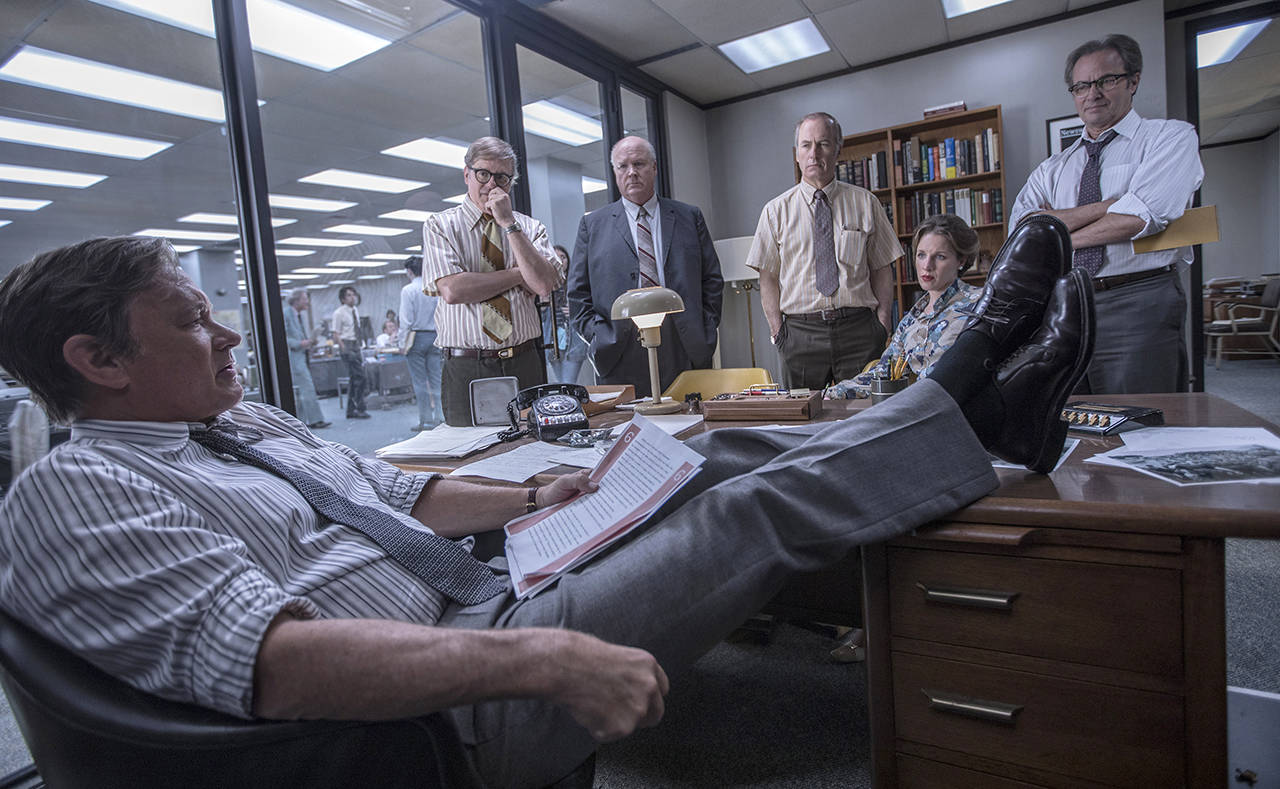‘The Post” is an unusual journalism movie in that The Washington Post’s most famous work is referenced only perfunctorily, while the film’s focus is on a story broken by another newspaper.
Perhaps because of that unorthodox approach, the film falls short of greatness. It is, however, first-class entertainment — enhanced by Steven Spielberg’s taut direction and an exceptional performance by Meryl Streep.
The film is set in 1971, when Daniel Ellsberg — a onetime Defense Department aide who became a critic of the Vietnam War — stole secret documents and leaked them to several newspapers. The 47-volume set, revealing three decades of government deceit about the war, became known as the Pentagon Papers.
As screenwriters Liz Hannah and Josh Singer (the latter an Oscar winner for another journalism movie, “Spotlight”) are honest enough to acknowledge, this story was first published by The New York Times.
The Post, however, also obtained copies of the documents. Hard-driving executive editor Ben Bradlee (played by Tom Hanks) wants to publish immediately. The decision isn’t so simple for Post publisher Katharine Graham (Streep).
The Nixon administration, contending the documents endanger national security, is threatening the newspapers with prosecution if they publish. Former Secretary of Defense Robert McNamara, heavily implicated in the scandal, is a personal friend of Graham’s.
Perhaps more to the point, the controversy might scare off potential investors as The Post attempts to raise capital by becoming a publicly traded commodity.
Why isn’t this film called “The Times”? Probably because Graham and Bradlee are more compelling characters than the largely anonymous editors of the New York newspaper.
Hanks’ good-guy persona prevents him from becoming a fully convincing Bradlee — by all accounts a tough, confrontational man. While Hanks gives a solid, professional performance, it lacks the Oscar-winning edge Jason Robards brought to the same character in “All the President’s Men.”
It doesn’t matter much, however, since Graham — the first female publisher of a major newspaper — is really the central character.
Having taken over the operation of The Post following the suicide of her husband, she is regarded as more of a socialite than a journalist by her employees, is patronized by her board of directors and harbors self-doubts over her qualifications for the job.
It almost goes without saying that Streep is equal to the challenge of depicting such a complex character. During a key scene in which she must give her publication decision while seemingly half the population of Washington is listening in on extensions, she runs the gamut of emotions in the space of about 10 seconds.
In contrast to “All the President’s Men,” which featured the likes of Robards, Jane Alexander, Jack Warden and Hal Holbrook in small but memorable roles, the supporting cast here is not exceptional.
Bob Odenkirk, however, is fine as Ben Bagdikian, the editor who brought the Pentagon Papers to The Post. And Bruce Greenwood provides a spot-on impersonation of a surprisingly sympathetic McNamara.
Spielberg sticks primarily to the facts, pushes most of the right buttons and keeps the audience engaged throughout the film’s 1-hour, 55-minute running time. The latter accomplishment is more difficult than it appears, for much of the story focuses on conversations with lawyers and reporters sifting through documents.
Spielberg and his writers stage a poignant scene in which Graham and Bradlee sadly ruminate over the difficulty journalists have in maintaining friendships with newsmakers. After Graham later observes that she doesn’t want to go through such stress again, the film ends ironically with the discovery of the Watergate break-in.
Given the financial and political blows daily newspapers have absorbed in recent years, “The Post” undoubtedly is intended to demonstrate the value of a vigorous free press.
That message is delivered, although the CEOs of today’s newspapers will likely adopt a “Yeah, whatever” attitude to Graham’s pronouncement that quality and profitability are intertwined.
But even those bean-counters wouldn’t deny that “The Post” is of Page One caliber.



